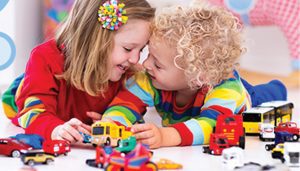By maidpro
 Remember those days (before kids) when it was safe to walk barefoot across a room without risk of stepping on a Lego?
Remember those days (before kids) when it was safe to walk barefoot across a room without risk of stepping on a Lego?
When your visual field wasn’t constantly being assaulted by assorted plastics in bright primary colors? When a tidy room might actually stay tidy for something longer than 3 minutes?
Right, us neither. If you have kids in the zero to preteen range (and that includes fur babies!), then toy chaos is a fact of life. You need to accept it, but don’t have to succumb entirely. Here are 5 tips for minimizing toy chaos in your home.
Dedicate excess storage capacity for toys. Let’s say, for example, you have 3 bins designated for daily toy storage. If those bins are stuffed full at the end of the day, you can pretty much count on them being dumped loudly and thoroughly at the start of the next day’s play. Double bin capacity and fill each one only halfway, making it much easier for kids to rummage through and find what they are looking for. Sorting and labeling bins by major toy types, by kid/toy ownership, and so forth further minimizes the likelihood of dumping.
Schedule playdates wisely. Some kids are just natural born scatterers. Like, you are quite sure they stand in the middle of a room, flinging things around when you’re not looking. Figure out who THOSE kids are and keep a closer-than-usual watch when they come over to play. Also, be honest.
If your kid is the scatterer, make sure they do at least their fair share of post-play tidying. If you are consistent with this, both dumping and scattering behaviors should abate over time.
Move toys in and out of heavy rotation. Keep a secret, well-out-of-reach space available for stowing away some portion of your kids’ toys. Every so often, when your kids are either out or asleep for the night, remove and stow a few items from daily bins. If you notice your child looking for something, you can surreptitiously return it to daily rotation. Or you can magically find stowed items on bad-weather days, when kids’ boredom levels are peaking. If a few weeks or months go by and a stowed item is never mentioned, you can be sure it’s safe to move along. That goes for brand new stuff as well. So, for example, let’s say you host a birthday party for your child’s entire class of 25 kids. Few children will remember all 25 gifts they opened (especially if they unwrap the gifts during their exciting party). Pay close attention to how they react when opening each gift. When they’re not looking, grab and stow the ones that receive the least-excited reactions. Add sticky notes to remind you who gave what and you can get away with re-gifting at other birthday parties or holidays.
Recruit kids for big toy cleanouts at least twice a year. Time these cleanouts for just prior to birthdays or big gift-giving holidays, so you can rationalize as “making space for all the new stuff you are going to get.” Other good strategies for convincing kids to part with their beloved old toys include appealing to their sense of:
Growing up and maturing – “Let’s give some of these old baby toys to your new cousin!”
Kindness and social justice – “Let’s donate some of these toys to kids who are less fortunate than you.”
Community – “Let’s help raise money for your school by donating some of these toys to the spring fair.”
Money and saving – “Let’s see if we can sell some of these toys on Facebook marketplace; you can use the earnings to start your own savings account at the bank.”
Special occasion – “Let’s make this fun; when we’re done, we can enjoy [fill in something fun or typically disallowed].”
As always, before donating toys, ensure they are safe, intact, in good repair, and as clean as you would want them to be for your own child.
MaidPro Marco Island –
MaidPro Naples – (239) 596-5200
MaidPro Ft Myers – (239) 437-5527









